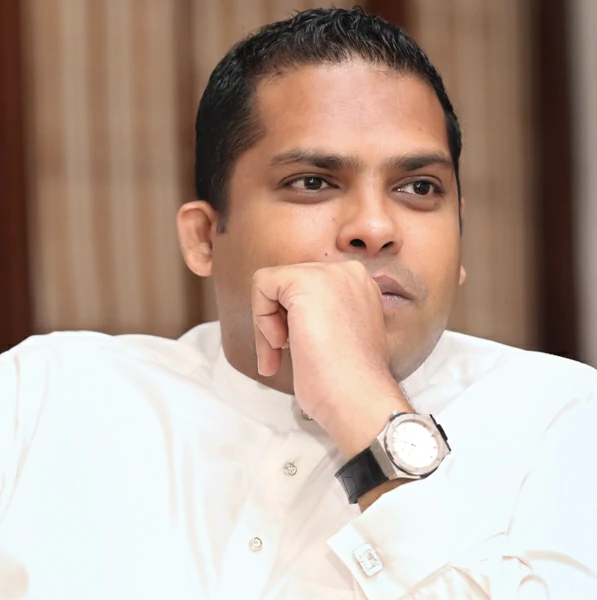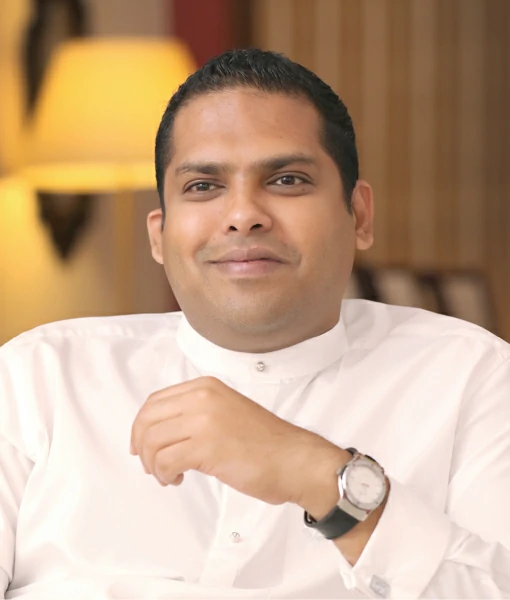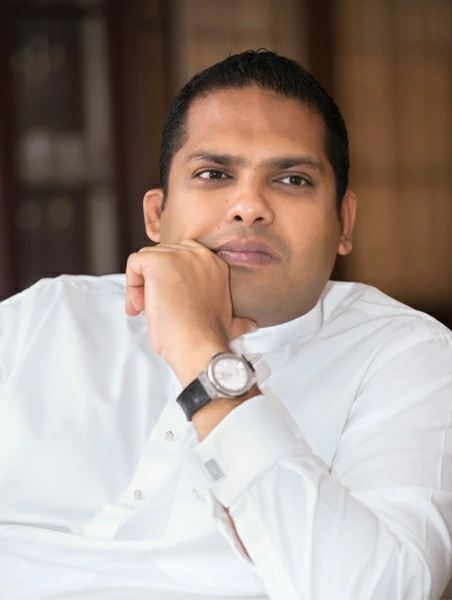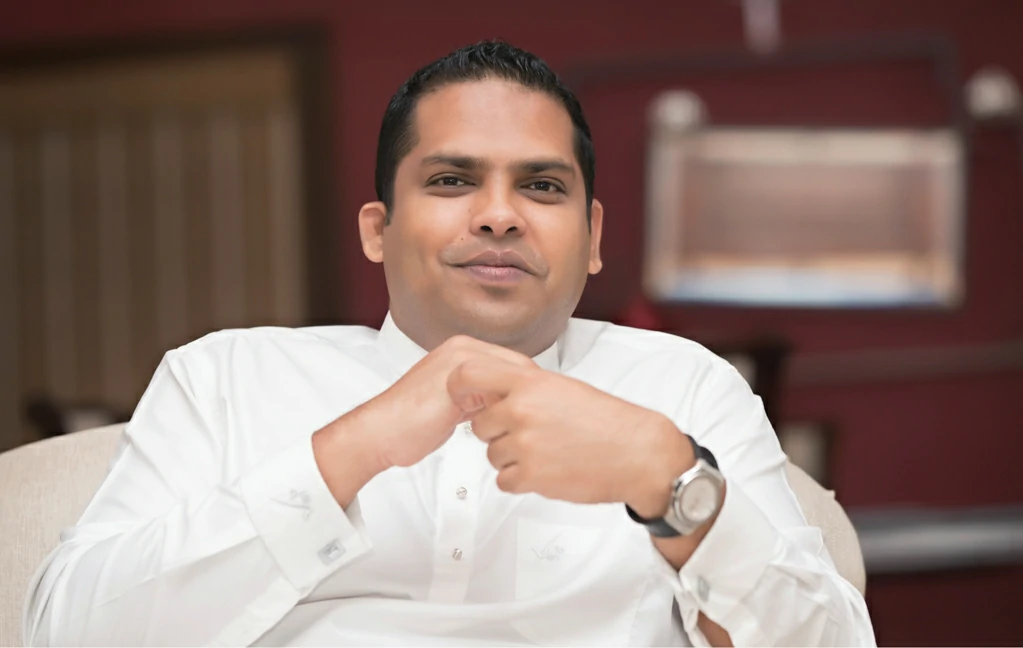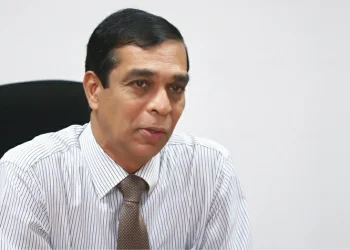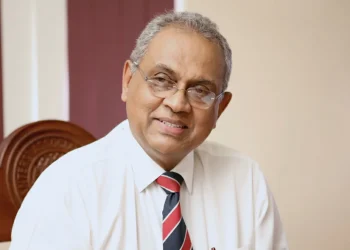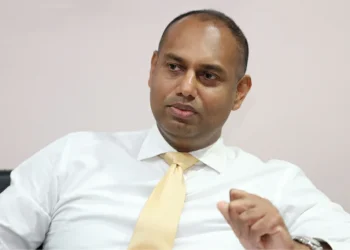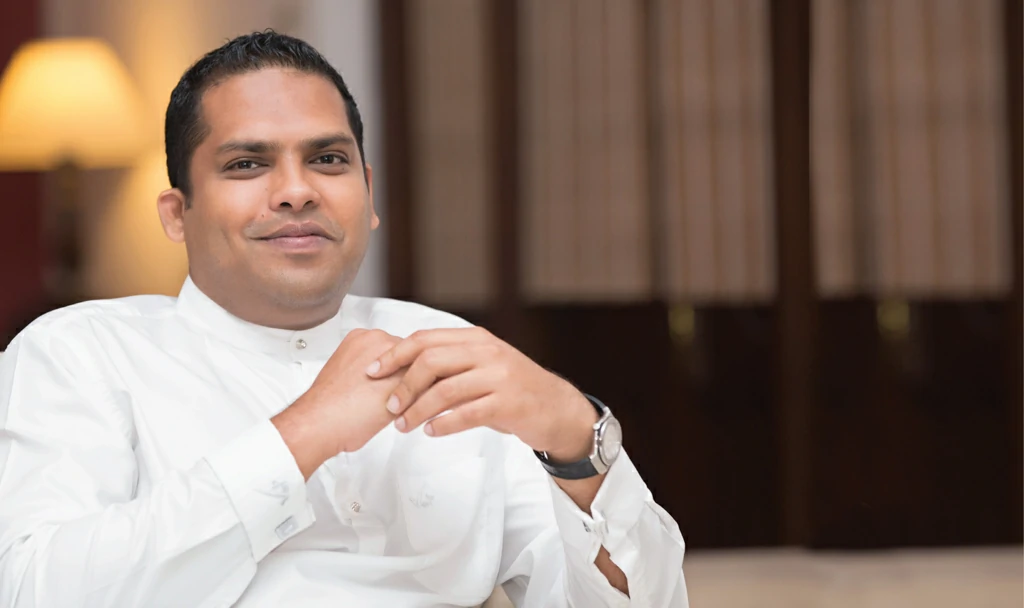
Harin Fernando, Minister of Telecommunication and Digital Infrastructure, is one of the young Cabinet Ministers of the current Government. He started the winning wave for the United National Party, with the Uva Provincial Elections that many do not remember today. The Minister speaks about the need to deliver on the promises made as every politician’s duty to his electorate. Many plans have been made to develop Badulla and the Uva Province. The sectors of telecommunication and digital infrastructure too are going through a massive change. There are extensive plans being formulated but delivery is the key.
By Udeshi Amarasinghe
Photography Menaka Aravinda and Mahesh Bandara
Who is Harin Fernando?
Harin Fernando is a citizen of Sri Lanka, a politician and father of two children. Born in Wattala and representing the people of Badulla. Currently holding a post of a ministry that is trying to create a digital revolution in Sri Lanka.
How did you enter politics and can you elaborate on your journey thus far?
I did not have any idea of getting into politics because I wanted to be a pilot during my school days. I went for my higher studies to Australia to specialize in management as my parents did not want me to be a pilot because they felt that I did not have the patience to do so. Once I returned to Sri Lanka I started working in a logistics company. During this time I had a small fallout with my father, which made me leave Colombo and go to Badulla to start a small business.
It is in Badulla that everything started. I fell in love with the people of that area. I got married from Badulla; my wife’s family was involved in politics. They gave me the opportunity to get into politics. At that time there was a huge vacuum in the district in terms of leadership and everyone rallied together to support me. I was one of the youngest politicians in that area and the UNP was losing heavily at that time. I had the opportunity and the platform to work with everyone and build up the confidence.
Why did you enter politics?
I do not think any politician knows why they got into politics. If they say it is because they wanted to do something for the country that is not really true. But being in politics pushes you to get you there at some point of your life due to various reasons. I probably got there because of my passion in wanting to achieve something in life. I also realized that there is a limit to what you can do alone. The greatest thing about doing politics is that your vision will be carried on. You can really get the people to follow you so that you achieve a common aim. But if you are just a social worker it is very difficult to get that attention and support.
The joy for me is the ability to make what I believe in a reality. In politics you are able to do that.
Why did you join the UNP at that time?
I am not from a political family and we were not UNP or SLFP. But I always supported the UNP. I was probably about three years old and we were living in Ratmalana at that time. My father knew former President J R Jayewardene. He took me for a function where I had to wear a ‘national’ and garland the President on stage. From that day onwards I always supported the UNP. That was the only reason for me to support the party. My first interaction with any political party was with the UNP. Ever since that time I have been following the green.
Politics at times is similar to a cult and people do not generally decide on principles. But for me when I started learning politics I preferred the centre right, liberal thinking, therefore I focused more on that type of political thinking and culture.
You resigned from Parliament to contest the Provincial Council elections. It is with you getting the highest number of votes in the Uva Province that the tide changed for the UNP. What can you tell us about this?
Many people have forgotten this day. The Prime Minister, Hon Karu Jayasuriya, Hon Kabir Hashim, my family and I: it was the few of us who decided I should contest the provincial council elections. While we were in the opposition there was a group of us; Ruwan Wijewardena, Harsha De Silva, Eran Wickramaratne, Ajith Perera and Niroshan Perera. We used to meet every week at Ruwan’s house and we would discuss matters till the early hours of the morning. We would discuss on how we could think out of the box for the UNP to form a Government. We had no alternative because everything we were doing was going against us and we had internal party issues as well. We were thinking of how we could turn things around.
The Western Provincial Council elections were held prior to the Uva Provincial Council elections. At that time we did suggest to Harsha to contest. However, he was not very comfortable with that because he had entered Parliament on the National List and did not have the experience of contesting an election. We did not want to push him either because he did not want to go for his first election in this way.
I Was One Of The Youngest Politicians In Badulla And The UNP Was Losing Heavily At That Time. I Had The Opportunity And The Platform To Work With Everyone And Build Up The Confidence.
I was the vocal person of the group and I had to contest against a Rajapaksa. That was the biggest challenge. This was not in Colombo either, which would have been easier. It was very difficult to get the campaign off the ground.
The Prime Minister asked me to contest the Uva Provincial Council elections, I agreed on the grounds that the party should unite.I spoke with Sajith about it and he agreed. This election would incur a great cost because it was an election against a Rajapaksa. We needed to gather momentum, my father who was my greatest funding source backed out because he had supported me to get into parliament previously and did not agree with this move. The Prime Minister went home and convinced my father who finally agreed but did not fund the campaign.
This was the best experience in my life, because when I resigned from Parliament to contest the election I said I will come back to Parliament again and that I will come back only as a minister. As such when I returned to Parliament it was a very emotional moment for me because I had said that without thinking to keep the morale high. When I won and actually came back to Parliament and was appointed as a Cabinet Minister I started to believe that there is a God above.
The intention during the Provincial Council election was very clear. We worked together as a party. The people wanted a change and the manner in which the people of Uva supported me was phenomenal. Words cannot describe how they came around. I spent only about 20% of what the other side spent on the campaign, but we were able to gather momentum. The best example of how the people can change is Uva.
The only reason I cannot sleep now is that I know that I have a responsibility towards the people who supported me. They have done their part and it is now my time to deliver to them on the promises that were made.
My Campaign Slogan Was About Change. People Knew That The Uva Election Will Not Bring About A Change In The Country But The People In Uva Believed In Me. This Also Validated A Point The UNP Was Still An Active Party.
You mentioned also that in the Uva election you contested against a politician who was considered almighty at that time. Can you tell us about that experience?
Politics is very unpredictable, this is a good experience for us as well. You should never become complacent and think that you are unbeatable. Generally, when the people start to feel tired of the Government they will want to teach a lesson. That can happen to any of us very easily. You should not get comfortable in your positions and you have to always be with the people.
My campaign slogan was about change. People knew that the Uva election will not bring about a change in the country but the people in Uva believed in me. This also validated a point the UNP was still an active party. We rose from 29 per cent to 44 per cent and with our partners we became 51 per cent. This created a great change in the perception of the country and they realised that the UNP was up and running.
When you look at the ethnic and religious breakdown the statistics are similar to the of the country. The entire Uva election was taken as an ideal sample by my Prime Minister on how the people of Sri Lanka will vote.
The UNP started to pick up in other areas as well because they started to believe in themselves. Even for His Excellency the President to leave the SLFP and contest with the UNP at the Presidential election, the Uva results would have given him the confidence. If the UNP was not able to garner the support of more than 42 per cent he would not have taken the risk.
I really do not know to this date how the former President Mahinda Rajapaksa got it so wrong, because I did not expect him to go for an early election. He would have still been the President. People would have just forgotten the Uva elections in a couple of months. But he got excited, in politics people make strategic and tactical mistakes when they think that they are losing in popularity. I did not actually win the election, I lost the district by around 5,000 votes. We did so well but we didn’t win the election, I didn’t become the chief minister. Within a few months people would have forgotten about it and I would not even be in parliament. But the whole thing turned because the former President called for an election.
That is why I say that there is a plan above, everything happens for a good reason.
What can you tell us about your electorate, Badulla?
My electorate of Badulla is very small within the district. It is one of the smallest electorates but I will consider the entire district. There is population of around 900,000, but the number of voters are around 620,000. It is a beautiful district but poverty is at its highest. If you take the AGA divisions out of the five poorest AGA divisions in the country three of them are in my district, it is not in Anuradhapura, Polonnaruwa, Hambantota or Ampara but in Badulla and Monaragala. As such it is quite a challenge.
We Have Only Three Years More And The Prime Minister Always Says That In The First Two Years If You Do Not Do Your Job Then We Will Have To Go Home. I Am Happy That People Are Finding Fault With Us…Such Expectations Keep Us Working Hard.
If you take the companies that operate in Monaragala (though it is not in my district Monaragala is in my province) there are only seven companies that employ over 25 employees in the whole of Monaragala district so you can imagine how unindustrialized those areas are. However, you can find enough and more labour in these areas. We have identified certain projects; we will be building one of the largest garment factories in the poorest AGA division in my district. The factory will be 4,000 square feet. We are laying the foundation very soon. We are also planning to establish an industrial zone. Tourism is a key area that we are looking at, the Prime Minister has a vision of having 15 resorts in the district. As you know Haputale and Bandarawela are beautiful areas. Then Mahiyanganaya: foreigners do not actually get an opportunity to see and experience our indigenous population the Veddhas as there are no proper hotels in that area. There is ample land in the Uva province. We have identified the areas and have planned a few projects.
Agriculture is an important sector with over 70 per cent engaged in this field. We are trying to bring in innovation and new technology to this sector. People do not realize how much technology will help them. It is also about educating the younger generation. Then diary farming is another area that we are looking at.
We have a domestic airport in Bandarawela now. We are bringing in a foreign university to Haputale as well. These are some of the many concepts that we are currently working on.
The Government has taken more than one year for all the planning as we believe that we should not do any projects on an ad hoc manner. I am totally against pushing people into Government offices. This is what all politicians do but that is not successful. I do not believe in that as well. Minister Nimal Siripala De Silva, my counterpart, is a person who has given many Government jobs but he lost two consecutive elections to me. I do not believe that by just giving a job you will win. You need to build a knowledge based economy. We need that economic development to flow into home towns. You need to build that entire ecosystem in the village.
We have only three years more and the Prime Minister always says that in the first two years if you do not do your job then we will have to go home. I am happy that people are finding fault with us, it should happen in the first year but not during the last year. Such expectations keep us working hard and I hope we will be able to deliver on our promises.
In Badulla you are up against veteran politicians of the SLFP such as Ministers Nimal Siripala De Silva and Dilan Perera. Your thoughts?
My policy has always been to respect my seniors, off the ground and on the ground. Politically I have my differences on party lines, but when we formed this national Government I have always respected them. I am the only person who won in all the nine electorates in the Badulla district. But, I am the only one who got a Cabinet portfolio from the UNP. The SLFP got three: Nimal Siripala De Silva got a cabinet ministry, Dilan Perera and Lakshman Seneviratne were sworn-in as State ministers.
I do not complain because I understand the concept. There is a greater meaning to this national Government; the reasons as to why we formed it and we believe in our President’s and Prime Minister’s vision. At this moment it is not about who I am going to be. People do not understand my ministry – Telecommunication and Digital infrastructure means nothing to them. It is not very lucrative or sound big enough for people in my area. I understand the scope of my ministry and it will take sometime for people to realize what I could do with it. At the moment it looks tricky because it seems as if I have been treated unfairly but that is not the case. I am fine with this ministry andI have the greatest respect for these senior politicians. They have done a lot for the area.I do criticize them as well but we are now one team in the national Government. We have a common goal to take this country forward.
For five years we want to work on a common agenda and get the people to work together. Once that works we can go back to our party lines.
You are one of the young Ministers in this government and also one of the young politicians in this country, what can you tell us about this achievement?
I believe in God and the other is luck. I never imagined that I would get here so fast. I never thought that I would be a Cabinet Minister at 37. I probably received this post because of my achievement in Uva where I was sworn-in as the Chief Minister after President Maithripala Sirisena won. I toppled the council the very next day and I got the power of the council. The council also respected me because I won a massive amount of votes. Shasheendra Rajapaksa got 90,000 and I got 170,000 votes, as such the respect was for me. The SLFP councilors signed the document and said that I should be the chief minister. Even I did not expect that. Everything happened to my advantage.
For Five Years We Want To Work On A Common Agenda And Get The People To Work Together. Once That Works We Can Go Back To Our Party Lines.
The SLFP was not happy that I got this post and even some of the UNPers were not happy when I was given this post, saying that I was too young. But the Prime Minister had stood his ground, because he recognized what I had done.
What can you tell us about the younger generation of politicians?
Most of the younger politicians are quite educated. It is not like those days; they are no longer about family bandism. Even if they come from a political family they are all very educated. I am very happy to see that most of them have been around the world, they have studied, they have the proper upbringing and background so it is easy to communicate with them rather than with the seniors. I feel very confident because we speak the same language besides party lines. At the moment it looks good. We feel very positive.
The only problem is being with the old age political thinking would corrupt them. Even now if the younger generation gets absorbed into the unruly behavior that occurs in Parliament that would not be good. That is why we need to live by example. Even I get carried away, there are situations where people say things but you must realize the gravity of what you do.
I have spoken to Namal Rajapaksa as well as Duminda Dissanayake on the need to for the younger generation of politicians to inculcate a different culture. The young members of UNP, SLFP and the other parties who are in the Parliament should form a group and we should change the way politics is done in Sri Lanka. It is then that the people will start respecting politicians. We have an issue where the people see politicians as a bunch of jokers. We should be happy that we have about 60-70 per cent voter turnout. In the Britain and US, they are worried about the modern population not wanting to vote. That is because they do not find anything positive in politicians. That can easily happen in Sri Lanka as well. in urban areas people do not find politicians any good. We need to change this culture and system.If there is only 40 per cent of the population voting then there is no point because the majority has not given their say in what they require the country to do.
You are the Minister for Telecommunication and Digital Infrastructure, can you tell us about the plans made for this sector and what has been achieved since you took over?
This is a very important sector – Telecommunication and Digital Infrastructure. Digital infrastructure is a new ministry that was created last year in line with the Prime Minister’s vision. We are focusing on connecting people. Sri Lanka’s internet penetration is about 28 per cent, even though accessability is around 80-90 per cent. That is one challenge that I need to address. The quality of the internet differs in terms of signal and speed. There’s difference in the speed as well. If the internet penetration increases by 10 per cent then GDP grows by 1.2 per cent. That is the statistics we go by. We are talking about quality internet, not social sites or other such activities.
This is our driving vision. We spoke to global innovators such as Google. We are doing a Google project in Sri Lanka these days where the balloon was sent from Brazil. That is an amazing innovation but we have had a few issues from our side. The public sector in Sri Lanka is such that even the Government cannot get things done. The TRC had to give us a small spectrum for the project. We had to fight our way through and attend meeting after meeting. The process was delayed for six months. The President and Prime Minister had to get intervene as well. If the Google balloon works the entire country will be 4G LTE connected. We will be the first and only country to have 4G LTE islandwide. That is regarding connectivity.
This Is A Very Important Sector – Telecommunication And Digital Infrastructure. Digital Infrastructure Is A New Ministry That Was Created Last Year In Line With The Prime Minister’s Vision. We Are Focusing On Connecting People.
The next important aspect is the content. Currently Sri Lanka Telecom is the only service provider to have the fibre optic backbone license. Whether Sri Lanka Telecom is performing to the timeline is the question. They do have a mobile arm Mobitel but that operates in a very different way. That operates as a very corporate company, Sri Lanka Telecom operates as a more Government sector company. Out of their operational costs 48 per cent are their salaries. The company is really struggling to move on. We are not going to make major changes to it but we want to make it more productive.
We want to push them and make them understand, if they do not perform we need the market forces to play a role. I have deadlines and I have to fulfill the people’s expectations so if they don’t perform we will have to bring in a competitor to compete with SLT.Fibre optics has been laid to every city in Sri Lanka. But they cannot get the last mile done. There is something wrong. By the end of this year they need to give 100,000 connections.
The main problem with SLT is that it is too unionized. For a ten-minute work time they will go for work to rule. It is difficult to change their thinking. I have been meeting all the unions and explaining to them what they need to do. The officials should really get their act together. They are working- I am not saying that they are not working- but there needs to be visionary leadership in there as well. Someone has to be very focused.
Sri Lanka as a country spends two million dollars a day because of non digitization. How does that happen? As a Government we provide social welfare benefits to the country, but sometimes there is a duplication of costs. We have developed a system and from January next year every citizen will have a digitization card. It is a digital key that will enable you to do all your transactions. This is one single card that will be able to do everything. Once this happens all your medical reports will be accessible to all hospitals, so that the patient does not repeat the tests at the Government hospital, which will be an additional cost.
My ministry has the second largest budget of 25billion rupees for this year and we have 348 procurements to finish. We have some of the biggest projects; cyber security, the national payment platform, LGC (the local Government cloud), which will connect 3,500 Government offices with 100 Mbs connection that would enable all the Government offices to have digital records. They will not have to type letter by letter or travel for meetings as we will provide video conferencing facilities as well. This has all been designed right now.
The next step is digital education. We will have 100 digital classrooms for the first year. We just got our budget approved for next year, 500,000 tabs with a keypad will be provided to students. We will be giving a tablet to every student from grade 9 onwards. The entire curriculum will be on the tab.
The Next Step Is Digital Education. We Will Have 100 Digital Classrooms For The First Year… We Will Be Giving A Tablet To Every Student From Grade 9 Onwards. The Entire Curriculum Will Be On The Tab.
I did a pilot project with Microsoft at Visaka Vidyalaya, Badulla. I gave four computers and we had a projector, content and Microsoft as part of their CSR provided the licensing to all their software. All the 28 students in Biology class were given email accounts and the teacher can email and correspond with the students on their homework and assignments. Videos are available as well. One girl stood up and told me that her knowledge was so different from what she would learn from a book. This was the exact same thing that was on my mind as well. When she said that tears came into my eyes, because I did not think that they would realize or understand the vision behind it. When they have these facilities when they can see what they are learning, education becomes easier and fun. She said that she is from a poor family from Badulla but with what has been given to her, she will be able to compete with any student in Colombo because of the equal opportunity provided. And, that is absolutely true because that is what we want to achieve; whether you are in Jaffna, Colombo, Badulla or Ampara you have the opportunity, accessibility to go anywhere you want to go in life.
These are very ambitious plans and there are challenges as well. Do we have the teachers? We have to first train the teachers. Younger teaches are quite eager to learn but the older generation are very scared of technology. We have many projects happening on the digitalization side. We are very confident that we will be able to do achieve all.
What comes under the purview of your Ministry?
At the moment I have only 3, that is Sri Lanka Telecom, Mobitel and ICTA (Information Communication Technology Agency). And it is this agency that has 348 procurements to finish. It is a quite a large agency where they do the planning, implementation and rolling out of projects of the Government’s entire ICT requirements.
What was your experience working with Microsoft? Your Ministry is also working with a few other international partners as well. What does this mean for Sri Lanka?
We are about to sign an MoU with Microsoft. They are a fantastic company and what we are trying to work with them is on developing innovation centres in Sri Lanka. Microsoft is an expert in the area of technology and innovation. Cyber security is an important aspect and we are working with them to establish a cyber crime centre in Sri Lanka. We want to identify from where the threats are coming from. It will be on a very large scale where every threat will be monitored.
I Do Not Want To Think Beyond But I Just Want To Make Sure That I Deliver During The Next Three Years. I Have Got A Fantastic Ministry, It Can Actually Touch Every Ministry And Every Segment Of Peoples’ Lives. It Is About Connecting People, There’s Nothing Without Connectivity.
The amazing part about Microsoft was the level of help they wanted to give Sri Lanka. They are giving us their licensing free of charge, they will build 22 innovation centres in Sri Lanka in the next five years. Six centres will be established next year. These innovation centres will be incubators as well. These will be next generation communication centres and not a mere computer centre. Microsoft will train Colombo university students and Moratuwa university students off campus. They will help them get funding as well. Young entrepreneurs will be given 1 million each for a startup in relation to technology and Microsoft will take it to the international circle. The reason why we wanted an international partner to endorse the innovation centres was to take products developed to a higher level. If we try to do that it will be really difficult to market it.
We have signed up with more companies; Ericcson is one and Oracle is another.
A student who is not good with their books may be good on their computers. That is what we really want the children to do. We want to create that interest. We want to have children gaming centres where a child in Colombo will play with another in Jaffna, Galle or anywhere else in the country. They can play simultanueously, which will create that interest. It is always good to have international exposure, because we need to develop Sri Lankan talent as well. Having international collaboration will help us in the long run.
With international brand names, it will be easier to convince investors as well. We are very focused on job creation as well. In terms of job creation we need local entrepreneurs to set up and begin to manufacture their products. If these international brands are confident to tie up with the local brand as their partners, then the Sri Lankan product will go a long way. That is what we believe in and we need a brand as Sri Lanka is still very brand sensitive. We need to be very careful in doing it, as we don’t want to burn a local entrepreneur out after investing a lot of money because we want to make sure they go into the right partnership with an international brand.
Currently the government is looking at converting analog to digital. Analog takes a large space of the spectrum. The spectrum is highly cluttered and there is very limited space for expansion. We will be looking at merging telecom operators because of country such as Sri Lanka our market requires only about three main players because in the long run none of the small companies are making any money either.
Next Steps?
The biggest responsibility I have right now is to deliver. I do not want to be a typical politician and tell the people that I was unable to deliver this time but to give me another chance the next round as well. I do not want to think beyond. I just want to make sure that I deliver during the next three years. I have got a fantastic ministry, it can actually touch every ministry and every segment of peoples’ lives. It is about connecting people; there’s nothing without connectivity.
